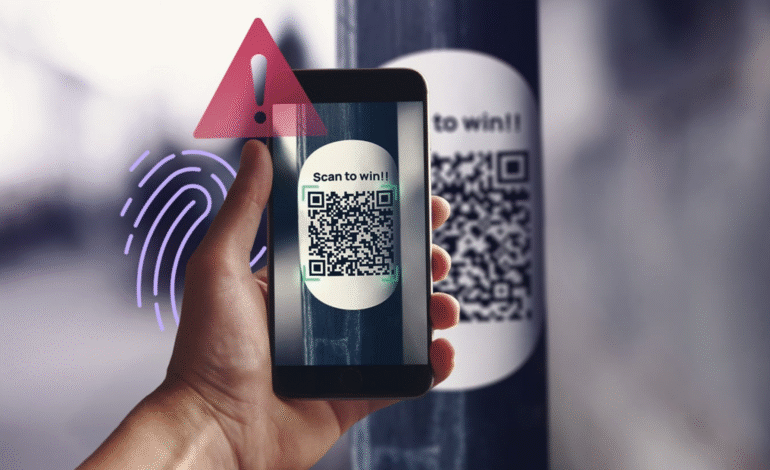Dubai QR Code Warning: Stay Safe from Cyber Fraud

The Dubai Municipality has shared an important warning for everyone living in the UAE — be careful when scanning unverified QR codes. These codes, found almost everywhere today, may not always be safe. According to the municipality, cybercriminals are using fake QR codes to trick people into revealing their passwords, banking details, and other private data.
The campaign is part of Dubai’s ongoing efforts to raise digital awareness and protect residents from cyber fraud. Through a short public video shared on its official channels, the municipality explained how users can stay safe when scanning QR codes and what signs to look out for.
Why Dubai Municipality Issued This Warning
QR codes are convenient and widely used — at restaurants, events, payment points, and government service centers. But the same feature that makes them easy to use also makes them a target for cybercriminals.
Scammers can create fake QR codes that look real. When someone scans them, they might be redirected to a fake website that collects personal information, or even downloads malware onto their device.
Dubai Municipality’s warning focuses on helping people understand that a single careless scan can lead to major problems like identity theft, loss of money, or hacked accounts.
Three Key Safety Tips Shared by Dubai Municipality
In its awareness campaign, the municipality highlighted three simple but powerful safety steps that every person should follow:
-
Never share personal or financial details after scanning
If a QR code takes you to a website asking for personal data, passwords, or card details — stop immediately. Only share such information if you are sure the website is official and verified.
-
Always check for “https://” in the website link
The “s” in “https://” stands for secure connection. If the link starts with “http://” or shows any warning, close it right away.
-
Avoid scanning QR codes in random public places
Never scan QR codes printed on walls, posters, or street signs without checking the source. Scammers often stick fake QR labels over real ones to trick people.
The Growing Cyber Threat Behind QR Codes
QR codes were created to make life easier, but hackers have learned how to use them for their own benefit. Here are some ways these cyber risks work:
Fake Websites (Phishing)
Cybercriminals design fake websites that look just like real banking, shopping, or government portals. When someone scans their code and logs in, the hacker gets access to their details instantly.
Malware Downloads
Some QR codes are programmed to download harmful apps or files automatically. Once installed, they can secretly steal contacts, passwords, and other sensitive data.
Fake Stickers in Public Spaces
Fraudsters place their fake QR codes on top of genuine ones in busy areas such as bus stops, parking meters, or restaurants. People think they’re scanning a trusted code, but in reality, they’re visiting a malicious link.
Auto Redirects
Some QR codes take users through hidden redirects before landing on the final page. During this process, hackers can collect data or inject tracking tools into your browser.
Trust Exploitation
Many people believe that if a QR code is visible in a public place, it must be safe. Scammers take advantage of that trust by placing codes where people least expect danger.
Rising Cybercrime Cases in the UAE
Dubai and other parts of the UAE are rapidly becoming smart, digital cities. This has made life easier for residents — but it has also opened the door for new cyber risks.
The UAE Cybersecurity Council has already warned about an increase in QR code-related scams across the country. Reports show that scammers are targeting users in crowded areas or public services where people often scan codes quickly without thinking twice.
The Dubai Municipality and other government bodies are now working together to educate the public on safe online habits and responsible digital behaviour.
How to Stay Safe While Scanning QR Codes
Staying safe is easy if you follow a few simple steps. These tips can help you enjoy the benefits of technology without falling victim to cyber fraud.
Before Scanning a QR Code
-
Look closely at the code— Is it placed over another sticker or damaged? It could be fake.
-
Check the location — If it’s on a wall, a random poster, or flyer, be cautious.
- Use a secure QR scanner app — Choose apps that show you the full link before opening it.
After Scanning the Code
- Read the URL carefully — Make sure it begins with “https://” and that the website name looks legitimate.
- Avoid entering personal details — Don’t enter passwords, OTPs, or bank numbers unless you are 100% sure of the source.
- Leave the site immediately if it looks suspicious — Exit and clear your browser history.
- Scan your phone or device — Use trusted antivirus software to check for threats.
If You Think You’ve Been Scammed
- Change your passwords immediately for all online accounts.
- Contact your bank and freeze your cards if you shared any financial information.
- Report the incident to Dubai Police or the UAE Cybercrime Unit.
- Run a full device scan and remove any unknown apps or downloads.
These quick actions can reduce the damage and protect you from further risks.
Dubai’s Efforts to Strengthen Digital Awareness
The municipality’s campaign is not just a one-time message — it is part of a larger movement across Dubai to create a digitally aware and cyber-safe community.
The UAE government has been promoting digital transformation for years, and this also means ensuring that citizens understand how to stay safe online. The municipality’s initiative supports national goals such as:
- Dubai Cybersecurity Strategy
- Dubai Green Mobility and Smart City Vision
- UAE’s National Cybersecurity Awareness Programme
Through education and awareness, Dubai aims to make every resident a responsible digital user who knows how to spot online risks.
How QR Code Scams Affect Everyday Life
QR code fraud doesn’t just target individuals — it affects everyone, from small businesses to government departments.
- For individuals: Scammers can steal money, clone identity cards, or misuse personal data.
- For businesses: Fake QR codes can damage brand reputation and cause customer distrust.
- For society: As scams rise, public confidence in digital services decreases, slowing progress toward a smarter, connected city.
This is why campaigns like this are essential — they protect both people and Dubai’s growing digital economy.
Easy Steps to Build Safe Digital Habits
Here are a few easy-to-follow practices that can make your online experience safer:
- Think before you scan — If something feels off, skip it.
- Use official apps and websites — Access services directly rather than scanning codes from posters or messages.
- Update your device regularly — Software updates close security holes that hackers try to exploit.
- Install antivirus or security software — This provides an extra layer of protection.
- Be aware of scams — Stay updated through trusted government channels and verified news sources.
When you build small habits like these, you help create a safer online space for everyone.
Why Awareness Matters Now More Than Ever
Technology continues to grow at an incredible speed. With new features come new threats. Scams that once happened through emails are now shifting to QR codes and messaging apps.
Dubai Municipality’s message reminds everyone that cyber safety is a shared responsibility. Whether you’re a student, a business owner, or a tourist, you can help make Dubai a safer digital environment by thinking twice before scanning any QR code.
How Businesses Can Support This Initiative
Businesses also play an important role in spreading awareness. Here’s how they can contribute:
- Educate employees about QR code safety, especially if they handle customer data.
- Use official QR codes with verified domains for company promotions.
- Display security notices near QR placements in stores, restaurants, or offices.
- Encourage customers to verify links and report suspicious codes.
By taking these small steps, businesses can protect both themselves and their customers from potential cyber threats.
Building a Cyber-Smart Dubai
Dubai’s commitment to innovation and technology is unmatched, but this success also requires strong digital security practices. The municipality’s campaign helps every resident understand that staying safe online starts with awareness and caution.
The message is simple — verify before you scan. As Dubai continues to evolve into one of the world’s leading smart cities, such awareness initiatives ensure that growth goes hand in hand with safety.







